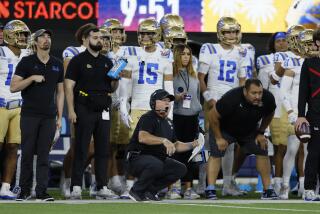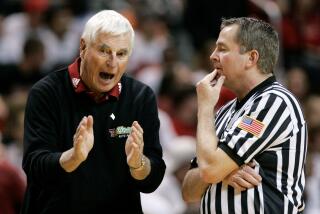Knight Embraces Cheers He Pretends to Ignore
- Share via
Here are all the things Bob Knight will tell you his coaching comeback at Texas Tech isn’t about:
Vindication. Validation. Redemption. Dean Smith’s career record for coaching victories.
Here now are all the things Bob Knight’s coaching comeback at Texas Tech is all about:
Vindication. Validation. Redemption. Dean Smith’s career record for coaching victories.
There’s one other myth that needs to be put aside: that the Bob Knight in the black sweater is kinder, gentler, mellower or in any way different from the Bob Knight in the red sweater. Let us, as Knight might put it, be smarter about this than all that.
What must be understood about Knight is that, like all coaches, he’s utterly insecure. One of the reasons defeat destroys him the way it does is that he questions himself every time his team loses. Although he’ll tell his players the losses are their fault, he’ll then go back to his office, locker room or local haunt and brood.
How, he’ll wonder, could I lose to a team coached by (fill in any coach’s name here)? Why can’t I make these kids understand what I’m telling them in practice every day?
Always, it’s about him. That’s part of his genius, the constant striving to be better even though in his heart of hearts he believes he’s the best. Any time there’s evidence that perhaps that might not be so, he can’t take it.
In 1981, after a loss at Purdue, Knight stalked to the back of the team bus to tell Isiah Thomas that he’d better enjoy playing that season because the next season when Dan Dakich arrived at IU, he would never see the floor again because Dakich, unlike Thomas, understood the game of basketball. Yes, that Dan Dakich. In 1986, after another loss at Purdue (he never took losing at Purdue very well), he informed Steve Alford that Indiana would never, ever be any good again until Alford was gone. Thomas and Alford, both of whom wear national championship rings, revel in telling those stories.
That’s why getting fired by Indiana so galled Knight. It was, of course, everyone else’s fault: the university president, the athletic director (whom Knight hand-picked), the rude student who called him “Knight” and all those who failed to understand him and all he’d done for IU.
But deep down it was still about him. The only way to make the world understand that he was right and they were wrong was to coach again, to win again, to get players to play better than they thought they were capable, to break Smith’s record of 879 victories.
Validation comes for Knight when he hears the cheers he pretends to ignore. He always loved the devotion of the Indiana fans, always made a point of walking on court long after everyone else was out there to hear those cheers.
Redemption for Knight will come from winning. What might have hurt him most in those last few years in Indiana was that some wondered if he’d lost his touch. Six seasons without a trip to the round of 16. Several embarrassing NCAA tournament performances, including a first-round loss to Pepperdine in 2000 in what turned out to be his Indiana finale.
Redemption will come through starting at square one. Knight will be at his best with a team like the one he has this season at Texas Tech. He’ll be more patient than with a more talented team. He’ll rail and scream, but he’ll also understand that this isn’t a team built to win championships.
Finally, the record: Knight, now 3-0 at Texas Tech, stands 113 victories shy of Smith’s 879. Why does that record mean so much to him, even though he keeps saying he doesn’t even know how many games he or Smith has won? (In fact, he can recall just about every one of his wins and losses). Because if you believe, as Knight does, that you’re the best coach who ever lived, you need tangible validation of that belief. John Wooden’s 10 NCAA titles are out of reach. Smith’s 879 victories are not.
More to Read
Go beyond the scoreboard
Get the latest on L.A.'s teams in the daily Sports Report newsletter.
You may occasionally receive promotional content from the Los Angeles Times.










